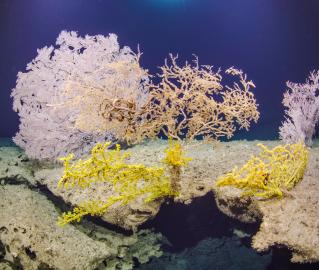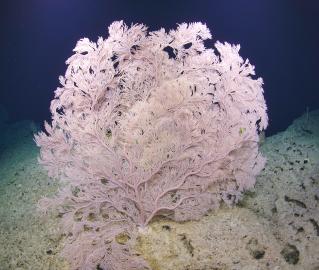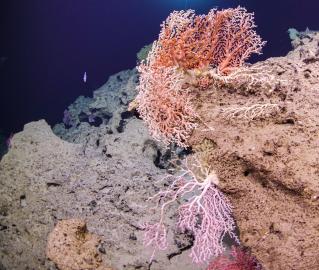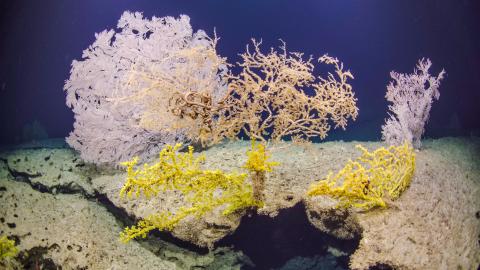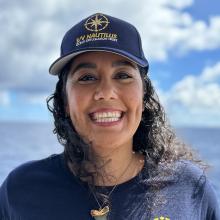
Daniella Griffay
Tell us about your work/research. What kinds of things do you do?
I have been teaching for 6 years now in Hawaii. The courses I teach are Biology, Marine Science, and AP Environmental Science. Prior to teaching, I worked as a fisheries biologist in Alaska for 10 years. I have also done some contracting work overseas in Australia and East Timor. I loved my time and the various jobs I did as a marine biologist but now it is time for me to help inspire and educate the next generation to take over.
What sparked your initial interest in your career?
As long as I can remember I have always wanted to be a marine biologist. I loved going to the tide pools in Hawaii and looking for critters. Now as a kid, I thought being a marine biologist meant swimming with whales and dolphins. As I got older I went to marine biology camps and took classes and learned more about what being a marine biologist actually entailed and I became even more fascinated. Now those same tide pools I use to visit as a kid look completely different and have lost their biodiversity. I notice changes in the environment and oceans and I want students to be aware of this. Hoped to inspire them to become environmentally conscious and stewards of the earth.
Who influenced you or encouraged you the most?
My parents have always been supportive of my career path and decisions in life. I definitely wouldn’t be where I am without them. Another big influence on me was my 6th-grade science teacher Mr. Schmidt. I remember this one day he had tons of specimen jars and all these books and resources. Our job was to identify as many of the jars as we can. The person who would identify the most got an A. I just thought this was the coolest and most fun thing to do. Having him as a teacher definitely sent me along the path to studying science.
What element of your work/study do you think is the most fascinating?
Doing fisheries biology work definitely has a love-hate relationship with it and it usually depends on the weather in the Bering Sea. One of the coolest things I ever witnessed was a pod of Orca whales taking down a baby humpback whale. It was bloody, sad, and powerful all at once. It plays with your emotions but is also this is life and nature. As a teacher, it is different and more subtitle. What always makes me smile is when a student I taught previously comes back for a visit to say hi or asks me for a letter of recommendation and says they want to study marine science or environmental science.
What other jobs led you to your current career?
I have had a very eclectic career. My first main science job out of college was as an Alaska Fisheries Groundfish Observer. For this job, I would work as a biologist on fishing vessels in Alaska collecting data for NMFS that was used to manage and maintain the different fisheries. I worked as an observer on and off for 6 years. Between contracts, I would often travel and live and work abroad. I spent a year and a half in Australia. I first had a job taking tourists out to the Great Barrier Reef and teaching them about the reef. I also got hired as a marine biologist consultant and worked on an environmental impact assessment in East Timor. When my visa was expired I returned to the US and worked for the International Pacific Halibut Commission for 5 years. As part of the IPHC, I would conduct yearly stock assessments to manage the halibut fisheries. Since 2017 I have been working as a high school science teacher but every once in a while I still go up to Alaska to do some fisheries work in the summer.
What are your degrees and certifications?
Bachelor of Science in Biology— University of Southern California
Master of Science in Marine and Environmental Science —University of Southern California
Master of Education for Secondary Science —Hawaii Pacific Education
What are your hobbies?
Hiking, scuba diving, and volunteering with students I am an advisor to our school’s environmental community volunteer club called Legacy Club
What advice would you give someone who wants to have a career like yours?
As a high school student, I would start of volunteering and taking as many science and math classes as I can. Then in college, you should talk to your professors and volunteer to work in their labs. During the summer apply for internships. Get your name out there and met as many people in the field as you can. It is a hard career path and you don’t make tons of money so you really have to be passionate and love what your study.
How did you get involved with the Ocean Exploration Trust?
At the start of summer 2022, I took a deep sea professional development course taught by Dr. Jeff Drazen. During the course, I asked if there was ever an opportunity for teachers to go on voyages. When this opportunity came up he sent me an email about it and I applied to be a Science Communication Fellow.
Expeditions
Daniella participated in the following Ocean Exploration Trust expeditions:
